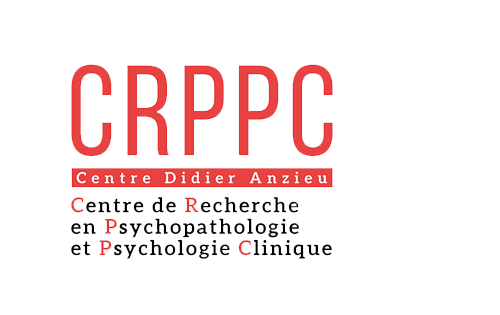The CRPPC team is structured around thematic lines stemming from the reorganization of a single research unit into teams in 2016. Our research is arranged along six lines, which allow for classification of the thematic paradigms under study:
- Psychodynamic approach to acts, violent actions, and clinical criminology
-
Coordinators: Magali Ravit, Barbara Smaniotto
Over the past five years, organizing a part of the CRPPC’s work around the “Body and Act” line allowed us to differentiate research addressing the body and somatic problems related to health from research involving acts and violence by including a clinical criminology approach (multidisciplinary dialogue between the psychodynamic approach and medical, sociological, and legal approaches to violence).
The CRPPC is particularly interested in forms of preverbal language and expressions of psychological language that do not possess symbolic forms. The CRPPC’s work has highlighted the specificity of the act as a form of “non-symbolic” language and the necessity of considering its meaning using approaches that implement symbolization.
This line explores outcomes from destructivity with regard to the process of symbolization. It accounts for violent acts as modes of psychopathological expression in which the act is a re-actualization of traces of first experiences (non-subjectified) of narcissistic disqualification as well as subjective deskilling. Archaic experiences are used throughout different expressions of actions, even as far as antisocial or criminal acts to allow for renewed recognition of the self through repetitive outcomes.
- Psychodynamics of health problems and the body
-
Coordinators: Nathalie Dumet, Raphaël Minjard
The line of research “Body and Act” sets out to develop research specifically focused on psychological challenges of clinical expression and on psychopathologies that massively affect both body and actions. These clinics are marked by emotional and relational exchanges that call on the interplay between the psychological and the somatic. They span major challenges in psychopathology and even modern psychopathology. They constitute some of their noisier and extreme forms, discontent and internal disarray, as well as individual, relational, familial, and socio-cultural suffering.Intersubjective bonds - Intersubjective bonds
-
Coordinator: Albert Ciccone
The line of research “intersubjective bonds” seeks to study intersubjectivity and its related formations. It aims to model and extract functions of intersubjective formations and thus clarify various forms of transmission between minds (inter- and transgenerational for the family, inter- and trans-subjective for groups and institutions). Certain privileged areas of study result from this: identifications, transferential processes, transmission. The fields of study allowing for interrogation of bonds and transmission are parentality and perinatality, family, group cultural and social transmission. Contemporary family transformations are studied with a view to updating bond and psychopathology models. Inter- and trans-subjectivity questions address transmissions and transformations of one state, one zone, one reality to another within each of the bond’s subjects. Research carried out by doctoral students accounts for notions derived from transmission between subjectivities (inter- and trans-disciplinarity, spatiality, scenality). - Contemporary social issues
-
Coordinators: Georges Gaillard, Jean-Marc Talpin
This line of research was instated in 2015 building on the former coordinators’ asymmetrical approach to forms of contemporary social issues. This line is devoted to the study of contemporary social issues and their effects on different psychological apparatuses on societal, institutional, group and individual levels on one hand, while dealing with the interplay between different apparatuses on the other hand. It seeks to study new group approaches from a psychoanalytic angle, grounded in the unit’s work on gender, family, filiation, institutions, and social meta-structure. Work on institutions, aging, end of life, humanitarianism, political-religious radicalization, as well as other subjects will specifically address the interplay between politics and psychology. This far-reaching line of research is present in the international network “Groupe.” The methodology in particular is one aspect allowing for integration of interdisciplinarity just as much as epistemologies distinct from directly concerned disciplines. This line is therefore open to collaborations with other research laboratories and institutions - Clinical evaluation of psychoanalytic approaches
-
Coordinators: Anne Brun, Eric Jacquet
This line of research is dedicated to establishing clinical evaluation criteria for therapeutic approaches in a broad sense (individual, institutional, as part of therapeutic mediations). Its central objective is to construct a clinical evaluation methodology in response to the classic critique of psychoanalytic epistemology’s non-refutability. The question of scientific evaluation of therapies has become a major issue for professionals and researchers. The objective is to provide theoretical fundaments of the psychoanalytic approach that apply equally to individual, group, and institutional settings. This research is grouped together as part of the “Research into Psychotherapies” network. An international collaboration working to review available data is currently under way (Art, Creativity, and Care).
Four principles structure this critical perspective: evidence through practice, pre-established unknowingness of evaluators, awareness of intersubjectivity, and the evaluation’s political dimension. The second subject of this line of research addresses tools specific to the process of symbolization using the game logic inherent in approaches to psychological care at national and international levels.
- Therapeutic mediations and the psychoanalytic approach to creation
-
Coordinator: Vincent Di Rocco
This line of research is dedicated to fundamental approaches to care practiced principally in institutions at every stage of life. These complimentary artistic mediations are often, but not always, well-known. The objective is to study the process of creation at different stages of life through these mediations from a psychoanalytic perspective. The part of the public this research concerns is most often resistant to traditional approaches to care. The research is structured from transferential movements onto the medium, the frame, the group, etc. and aims to evaluate processes of symbolization and the contribution of psychological work mobilized by subjects’ sensoriality and motricity. Two central objectives are being pursued: establishing a metapsychology of therapeutic mediations on one hand, and studying the game model in mediations, its communicative, cathartic, and sensorial potential, on the other. This line of research is supported in this work by the “Evaluation of clinical approaches” line.
Knowledge previously established by the CRPPC on the psychoanalytic approach to groups, creation, and the creative process are used in service of the study of therapeutic mediations in subjects experiencing great psychological difficulties.



